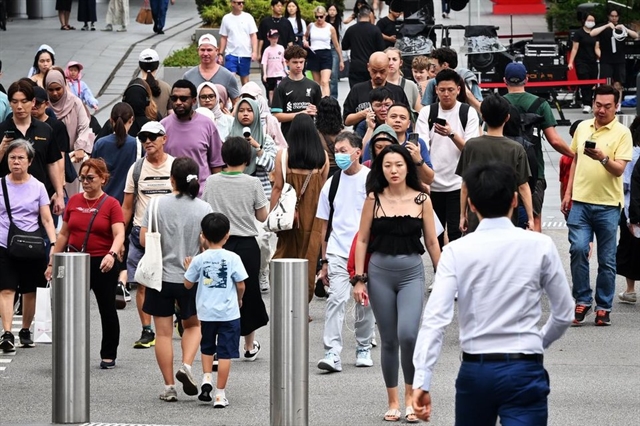 World
World


|
| Over three-quarters of Singaporeans agreed that their ideas about religion or spirituality were one of the most important parts of their lives, according to the recent survey by Singapore's Institute of Policy Studies. THE STRAITS TIMES/ANN Photo Kua Chee Siong |
SINGAPORE — Religion has become a more important part of Singaporeans’ identity in recent years, according to a report released by Singapore's Institute of Policy Studies (IPS) on Wednesday.
At the same time, the way people here are practicing their religion has evolved to become more personal, with a greater emphasis on meditation and consuming religious media and less on attending religious gatherings.
In its latest report, which was focused on religious identity and practice among Singaporeans, IPS found that over three-quarters of Singaporeans agreed that their ideas about religion or spirituality were one of the most important parts of their lives, and that these ideas have considerable influence over their views in other matters.
Respondents were asked eight questions about religion and spirituality - such as whether their spiritual beliefs gave meaning to life’s joys and sorrows - across three surveys done in 2013, 2018 and 2024.
In general, a growing majority of people agreed to all the statements - that religion had influence over their lives - across the three surveys.
The largest increase was for the statement that life would be meaningless without a sense of spirituality. More than six in 10 respondents agreed with this in 2024, compared to half of respondents in 2018.
While nationality was consistently ranked as the most important part of Singaporeans’ identity across the three surveys, researchers noted that the importance of religion rose considerably over time among those who professed a religion, which consisted 80 per cent of respondents.
The latest report used data gathered between April and August 2024 from a representative sample of 4,000 Singaporeans and permanent residents aged 18 and above, who were asked some 350 questions on race, religion and language.
IPS’ first report from the data, released on February 3, found that the outlook on racial and religious harmony in Singapore had improved in the past five years, with more people here rating the nation’s state of harmony as high or very high.
At the same time, levels of trust among people of different races here had also risen, and more people agreed that racial diversity is beneficial for Singapore.
In this report, IPS found that Muslims were more likely to consider their religion to be very important to their overall sense of identity, with nearly six in 10 saying so. This is compared to 38.4 per cent for Christian respondents, 32.9 per cent for Catholic respondents and 32.8 per cent for Hindu respondents.
These proportions had largely held stable over the years for the above groups, while more Buddhists and Taoists said religion was important to their identity in the 2024 survey.
Older respondents were generally more religious, regardless of their affiliation, while younger ones were more likely to say that they had sought additional knowledge about their religion.
More religious respondents were also accessing religious media such as songs and videos, or turning more to individualised religious practice such as meditation or reading related literature. On the other hand, fewer respondents said they were praying daily or attending religious services compared to earlier surveys.
The report, authored by Dr Mathew Mathews, Dr Teo Kay Key, Izzul Haziq Murad and Melvin Tay, said the shifting practices of religion here “clearly mirror changes in the social and religious landscape”.
For example, the COVID-19 pandemic accelerated the growth of religious media online, while many religious groups developed digital methods to engage their adherents to make up for restricted access to physical spaces.
Meditation, which has roots in many religious settings, has also become popularised in various secular settings, they noted.
Overall, it seemed clear from the data that there was a growth in religious identity and orientation among religious Singaporeans, which constituted an overwhelming majority of society here, said the researchers.
Reflecting on their findings, the researchers said that the growth of religious identity here means there is a possibility that religious groups may push more for their beliefs to be considered in policymaking.
Religious individuals may also feel their traditions should be given greater public attention and space, they added.
“While this stronger sense of identity and community amongst religious affiliates can help provide comfort and support, especially through difficult times, there may be implications to religious harmony, if these growing ties also lead to more jostling for space and influence between the various religious groups,” said the researchers.
Such tendencies will be mitigated by Singapore’s framework to maintain religious harmony, but refinements will always be needed to maintain the delicate balance, they said.
This includes careful consideration of individuals’ exposure to online religious media, which tends to be originated from other countries, which have differing contexts that may allow for advocacy of religious ideas and practices that run counter to the realities of practicing faith in a multicultural society, the researchers added.
With an ageing population and results that show older Singaporeans tending to be more religious, researchers said community programmes should also be designed such that they respect and accommodate religious needs, such as dietary requirements and caregiving practices
The latest report comes about a month after IPS release findings on prejudice, attitudes and perspectives on race based off the same data set.
That paper found levels of prejudice here to be stable or improving across race, religion, nationality, age, gender, language and sexual orientation, as compared to 2018.
But experiences of discrimination persist, in particular among minority groups and younger Singaporeans, which the researchers pointed out as an area that policies and programmes should continue to address. — THE STRAITS TIMES/ANN